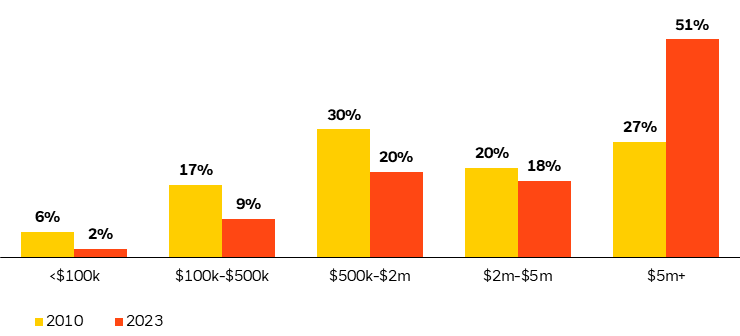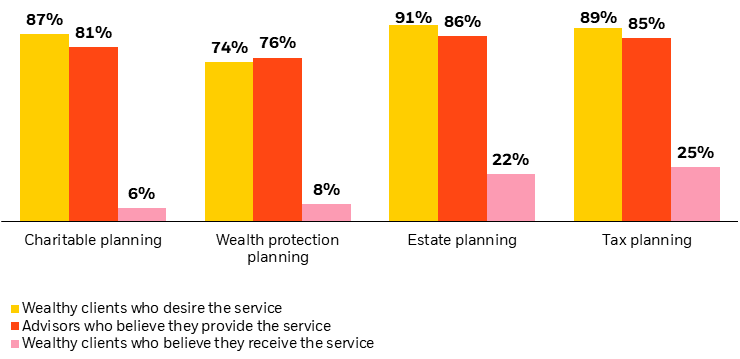Practice Management

What you need to know
- An increasing concentration of wealth in the high-net-worth market is driving heightened competition among advisors seeking to win clients in this space.
- If you want to attract wealthier clients, show them what makes you different and how they will benefit by choosing you.
- Revisit your value proposition through the lens of your ideal high-net-worth client to position yourself for success.
Advisor competition to serve wealthy clients is increasing
U.S. wealth is becoming more concentrated. More than half of U.S. household investable assets – nearly $40 trillion – is controlled by just 2.2% of the population. As of the end of 2023, households with assets of $5 million or more hold 51% of total U.S. investable assets compared to 27% in 2010.1 A growing high-net-worth market coinciding with a historic multigenerational wealth transfer creates heightened competition among advisors seeking to capture opportunities to serve clients in this space.
Assets are concentrating in wealthier households
Distribution of investable assets by household net worth

Source: Cerulli, “U.S. High-Net-Worth and Ultra-High-Net-Worth Markets 2024.”
Advisors may struggle to attract high-net-worth clients if their value proposition is too common or lacks clear benefits. ‘Providing financial planning services’ and ‘superior customer service’ are viewed as table stakes in the high end of the market. Offering ‘comprehensive services’ may be meaningful to an advisor, but clients only care about the services they need. Having a team with ‘300 years of combined experience’ does not benefit the client unless they are served by every member of the team. Saying that you ‘manage $1 billion in client assets’ does not assure a $5 million client that you will be attentive to their needs.
To compete in the high-net-worth market, your value proposition has to be more than a collection of marketing buzz words or a list of core values. It should be meaningfully aligned with the unique needs and preferences of wealthy investors and communicated in a way that signals distinctiveness and exclusivity. Given the many advisors eager to serve high-net-worth clients, it is critical that your value proposition helps you stand out from your competitors.
Revisit your value proposition from a high-net-worth perspective
Your value proposition explains who you serve, what you do for them, how you do it, and why you do it. Review each of these aspects of your value proposition from the perspective of the high-net-worth clients you wish to attract.
1. Who do you serve?
Think about the high-net-worth clients you currently serve. Among them, who is profitable, a good source of referrals and enjoyable to work with? You likely have several clients coming to mind. These are your ‘ideal clients.’ They are aligned with your investment approach and philosophy, and their needs fit nicely into your service model.
Look for common characteristics across the ideal clients you’ve identified. For example, they might be corporate executives, real estate investors, venture capitalists, business owners, wealthy widows or philanthropists. Articulate your value proposition using language that resonates with clients and prospects who fit the profile of your ideal client.
Catering to a particular niche can be a differentiator for your business and a driver of growth as clients refer you to similar potential clients within their social or professional circles.
2. What do you do for them?
Wealthier clients have more sophisticated needs and higher expectations versus the broader market. They focus on priorities like tax minimization, capital preservation, asset protection and strategies for transferring their wealth. They expect advisors to deliver specialized services, deep expertise and customized solutions that simplify their most complex problems. The breadth of their needs provides ample opportunities to differentiate yourself from competitors.
Consider how your service model aligns with the needs of your target audience. What do you do especially well that is uniquely valued by your ideal clients? Providing specialized services such as long-term health & wealth planning, family financial education or entrepreneurial services for business owners can set you apart from other advisors.
If you differentiate your practice based on a special service you offer, it is especially critical that what you deliver aligns with what clients expect. A recent study uncovered disparities between the services advisors believe they are providing and the services clients believe they are receiving. Looking at the largest of these disparities, 87% of wealthy investors want help with charitable planning and 81% of high-net-worth advisors believe they are providing it; however, only 6% of these clients believe they are receiving this service from their advisors.
The disparities are likely due to differences in how the services are defined by advisors versus clients. In the case of charitable planning, an advisor may be providing advice about making gifts from tax-deferred accounts and the benefits of donating securities, while the client may be seeking to establish a donor-advised fund or a family foundation. Another potential contributor to the disparities may be clients lacking awareness of their advisor’s offerings.
Deliver what clients expect
Disparities exist between the services advisors provide and the services clients believe they receive

Source: CEG Insights, “Play to Win: Addressing the Gap Between Investors’ Expectation and Advisor Services,” 2023.
As part of your annual review meetings with clients, discuss your list of services in detail and ask clients if they have needs you have not addressed. If you discover gaps in your services, consider partnering with a third-party to access the necessary expertise.
3. How do you do it?
Whether your value proposition focuses on catering to a particular niche or offering a specialized service, you may find that you’re not the only game in town. If the advisor down the street does what you do, consider how you do it differently and how that benefits your clients.
Think about the experience you provide from your clients’ perspective. Compared to your competitors, you might deliver similar services but with greater simplicity, transparency or personalization. Perhaps you possess advanced technology that allows you to provide more timely and informative account statements. Or you might offer more conveniences like virtual meetings and online document sharing. The way in which you deliver your services to clients can set you apart from the competition.
4. Why do you do it?
Your value proposition goes beyond the service and client experience you provide. It’s about you. Why do you do what you do? Was there an event or theme in your life that inspired you to help high-net-worth clients manage and protect their wealth? Share your personal journey to let clients and prospects understand who you are and what drives you. Your authenticity makes your value proposition more credible and creates trust. Moreover, your story is a distinct differentiator that no competitor can replicate.
Activate your high-net-worth value proposition
Once you’ve fine-tuned your value proposition to attract wealthy clients, put it into action and maximize its impact:
- Become your brand. Everything you do for clients – and the way you talk about what you do – affects how clients feel about you. Be intentional about the feelings you want to create or the shift in mindset you want to impart as you create and communicate your value proposition. Remember, this is the articulation of the value that you – and your brand – deliver.
- Communicate consistently. Your web site, social media presence and marketing materials should communicate the same key points of your value proposition that you share in face-to-face discussions with clients and prospects, your professional network and acquaintances.
- Emphasize what is most relevant for your audience. When you discuss your value proposition with high-net-worth clients or prospects, emphasize the points that matter most for them personally.
- Share client stories. Your value proposition comes to life when you share real-life examples of how clients have benefited from working with you. Tell clients and prospects about specific situations where you solved a problem or identified an opportunity that made a significant impact on a client similar to them.
BlackRock can help you succeed in the high-net-worth market
The BlackRock Business Consulting team has helped thousands of advisors, teams and firms evolve their practice to attract the clients they wish to serve. Ask your Market Leader for more information and explore our online resources designed to help you attract and retain high-net-worth clients for enduring business growth.
Related resources
More articles loaded. Use Shift+Tab keys to browse.
Total articles:
Access exclusive tools and insights
Explore My Hub, your personalized dashboard for portfolio tools, market insights and practice resources.





